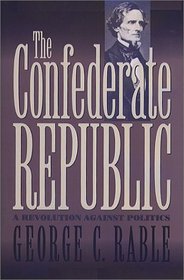Michael O. (modorney) reviewed The Confederate Republic: A Revolution Against Politics (Civil War America) on + 6 more book reviews
An excellent book giving the insight behind the creation of the Confederacy.
To a great extent, the South attempted to re-create the atmosphere around the birth of the nation, before the evolution of political parties, conventions and campaigning.
The author poses the paradoxes and mixed messages of the day. For example, the South needed, for economic reasons, to fight a defensive war. But the South had better generals, more suited towards offfense. The South was crippled by high tariffs, but needed a way to raise revenue for war. And, the South wanted a limited, inexpensive confederacy, where states had much authority. But this made raising an army difficult, especially when it was fighting in another state. Slavery was, naturally, favored, but importing slaves from border states, and even from Africa was discouraged.
And, the nature of slavery was tied to the concept of a hierarchy by race, more than an economic institution. I've often felt the issue of slavery was simply economics. And freeing the slaves would cost the plantation owners money. They could be compensated with land farther west, which the government had in abundance. And the western lands would not be depleted of nutrients by repeated crops of cotton. But, as this book explains, the South was bound by more than economics, and the existence of slavery was necessary.
There are many books about the military part of this era, but few about the politics. This excellent book is one of those few.
To a great extent, the South attempted to re-create the atmosphere around the birth of the nation, before the evolution of political parties, conventions and campaigning.
The author poses the paradoxes and mixed messages of the day. For example, the South needed, for economic reasons, to fight a defensive war. But the South had better generals, more suited towards offfense. The South was crippled by high tariffs, but needed a way to raise revenue for war. And, the South wanted a limited, inexpensive confederacy, where states had much authority. But this made raising an army difficult, especially when it was fighting in another state. Slavery was, naturally, favored, but importing slaves from border states, and even from Africa was discouraged.
And, the nature of slavery was tied to the concept of a hierarchy by race, more than an economic institution. I've often felt the issue of slavery was simply economics. And freeing the slaves would cost the plantation owners money. They could be compensated with land farther west, which the government had in abundance. And the western lands would not be depleted of nutrients by repeated crops of cotton. But, as this book explains, the South was bound by more than economics, and the existence of slavery was necessary.
There are many books about the military part of this era, but few about the politics. This excellent book is one of those few.




